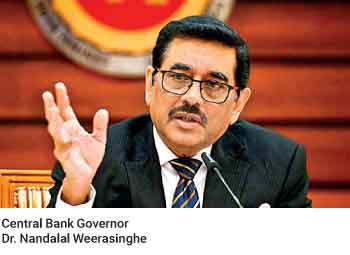Sunday Feb 15, 2026
Sunday Feb 15, 2026
Saturday, 30 December 2023 01:45 - - {{hitsCtrl.values.hits}}
 The Central Bank yesterday released the Financial Stability Review (FSR) for 2023 which encapsulates the developments in the financial system, the risks and vulnerabilities identified thereof, and the policy measures taken by the CBSL and other regulatory institutions in addressing such risks.
The Central Bank yesterday released the Financial Stability Review (FSR) for 2023 which encapsulates the developments in the financial system, the risks and vulnerabilities identified thereof, and the policy measures taken by the CBSL and other regulatory institutions in addressing such risks.
The review period primarily covers data up to end September 2023.
According to FSR 2023 the financial sector, which experienced an unprecedented array of challenges in the aftermath of the economic crisis, continued to operate under challenging conditions. The overall economic contraction during the nine months ending September 2023 coupled with tax hikes aimed at supporting fiscal consolidation; and elevated price levels and interest rates resulted in strained balance sheets of economic agents. Accordingly, financial intermediation witnessed a considerable decline reflecting the subdued demand and supply conditions for credit amidst a considerable deterioration in credit quality. Financial sector exposure to the Government continued to increase amidst the fall in overall credit growth, highlighting imbalances that pose challenges to the financial sector. While the approval of International Monetary Fund’s Extended Fund Facility (IMF-EFF) in March 2023 brought in confidence, ensuing developments such as uncertainties about the sovereign debt restructuring process and the results of the bank diagnostics exercise raised some concerns on the sector.
Reflecting the early impact of monetary policy easing, the private sector credit-to-GDP gap (the credit gap), which reflects the status of the credit cycle, signals that the trough of the cycle has passed, and the cycle has entered the recovery phase.
With these developments, financial markets which witnessed extreme turbulence in 2022 demonstrated signs of stabilisation. Financial market’s stress as indicated by the Financial Stress Index remained broadly at low levels in the first ten months of 2023 as overall market conditions significantly eased compared to 2022. Volatility of share market indices gradually subsided though investors continued to be attracted to high yield investments in the form of Government securities.
Commenting on the financial stability outlook the FSR said the easing of domestic monetary policy since mid-2023, is anticipated to facilitate the recovery in financial intermediation, which was witnessed through the gradual recovery in banking sector credit during Q3 of 2023. This is expected to lead to a rebound in domestic demand and economic activity as witnessed through the modest economic growth recorded in Q3 of 2023, improving income levels and alleviating pressure on the balance sheets of households and firms.
Moreover, targeted stabilisation of domestic inflation at 5% in the medium term is expected to enhance the purchasing power of economic agents and improve their debt repayment capacities. Efforts are underway to address the Sovereign-Bank Nexus4 through policy reforms, aiming to rectify financial intermediation imbalances in the medium to long run.
Recent positive developments, such as reaching an agreement in principle with the Official Creditor Committee (OCC) and the Exim Bank of China, contribute to the stability in the Government securities market. The anticipated conclusion of External Debt Restructuring (EDR) is expected to further enhance stability. Efforts are also required to improve sustainable foreign currency inflows to prevent external sector imbalances along with prudent measures towards risk mitigation by the financial sector.
Moreover, banks are expected to strengthen their capital buffers, considering the potential losses which may arise from debt restructuring, results of the bank diagnostic exercise, and realisation of forward-looking impact assessment.
Although it is expected that the existing macro-financial vulnerabilities would dissipate in the period ahead, with the envisaged improvements in the macroeconomic front, continued advancement along the policy reforms agenda envisaged in the IMF-EFF agreement is essential, particularly in the fiscal front to direct the economy and the financial system into stable grounds.
“Any deviation from this path would bring detrimental and irreversible consequences to the financial system and the economy, though moving along this arduous and narrow path is challenging,” according to the FSR. The instigation and operationalisation of strong and appropriate frameworks that proactively address vulnerabilities and implementation of timely, well sequenced, and consistent policies is also crucial to ensure the stability of the Sri Lankan financial system.
As the economy undergoes a monetary policy easing cycle, the credit cycle is expected to enter an expansionary phase, in which macro prudential concerns could build-up. The Central Bank commits to monitoring these developments closely and implementing necessary policy actions to mitigate systemic risks and ensure financial stability through macro prudential interventions.
The electronic version of the publication can be accessed through the Central Bank website.
(https://www.cbsl.gov.lk/sites/default/files/cbslweb_images/publications/fssr/fssr_2023e.pdf)